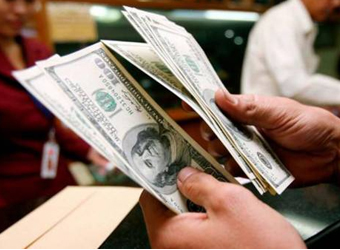Dollar prices slid to a 15-month low against the yen on Wednesday, as investors remained on edge ahead of key U.S. inflation numbers later in the day, underscoring fragile risk sentiment following the recent shakeout in equity markets.
The U.S. currency was 0.7 percent lower at 107.050 yen, its weakest since November 2016, with a drop in Japanese shares increasing demand for the yen which is often sought in times of market turmoil.
The dollar had enjoyed a brief respite against its Japanese peer overnight as U.S. shares managed to gain for the third successive session on Tuesday following last week’s sharp downturn. But it began to wobble again as Japan’s Nikkei surrendered early gains and fell on Wednesday.
Near-term focus was on how far the dollar would slide against the yen after falling below 107.320, which was seen as a key technical level.
“Trend-following macro funds see the yen appreciating further. There are no fresh factors, but for speculators, anything that appears yen-supportive is welcome, even in hindsight,” said Yukio Ishizuki, senior forex strategist at Daiwa Securities in Tokyo.
Lingering expectations the Bank of Japan would follow the Federal Reserve and the European Central Bank in eventually normalizing monetary policy have helped the yen appreciate, even though the Japanese central bank has reiterated that it intends to stick to its ultra-easy stance.
“Many trend-following players have a scenario drawn up in which the BOJ follows a monetary policy normalisation cycle,” said Koji Fukaya, president at FPG Securities in Tokyo.
“However, following such a scenario and driving the yen higher means that the BOJ would be even more determined to stick to an easy policy and prevent the currency from appreciating and shield the domestic stock market.”
Volatility in the risk asset markets have been a key driver of currencies and investors now await U.S. January inflation data due at 1330 GMT, with the indicator seen either upsetting the equity market’s fragile recovery or clearing the way for additional gains. Wall Street shares slumped from record highs scaled late in January after Treasury yields rose to four-year highs, largely because of inflation worries.
Seasonally adjusted U.S. consumer price index data is expected to show inflation of 0.3 percent in January versus 0.1 percent in December.
The dollar’s fall against the yen comes against the currency’s broader declines against a number of peers.
The U.S. currency attracted demand during the global market tumult seen earlier this month, although it had fallen to a three-year low against a basket of currencies in January.
The dollar was weighed by factors including the prospect of the United States pursuing a weak dollar strategy and the greenback enjoying less interest rate advantage as other countries part with easy monetary policy.
The dollar index against a group of six major currencies was down 0.3 percent at 89.447 after dropping nearly 0.6 percent overnight.
The euro added to overnight gains and last traded up 0.3 percent at $1.2384.
The New Zealand dollar gained 0.75 percent to $0.7329 after a Reserve Bank of New Zealand’s quarterly survey showed business managers forecast annual inflation to average 2.11 percent over the coming two years, from 2.02 percent in the previous survey.
The Australian dollar was 0.25 percent higher at $0.7880.
Source: Reuters


